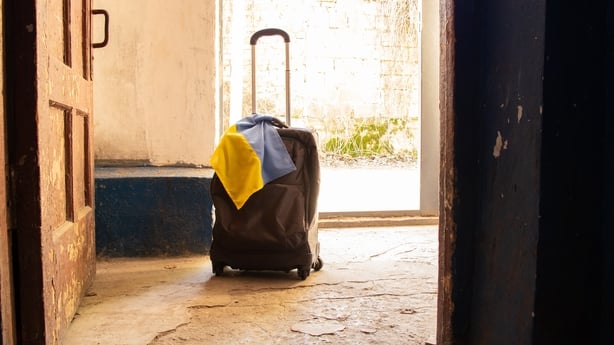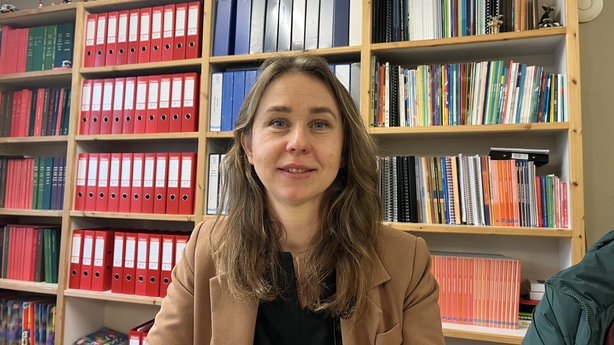Poor quality food, overcrowding, damp and mouldy conditions, and concerns over the safety of children have all been highlighted in a survey of Ukrainians living in State accommodation.
Since the invasion by Russia more than two years ago, over 50,000 Ukrainian beneficiaries of temporary protection have been put up in centres in Ireland.
A survey was carried out by Doras, a refugee and migrant rights organisation, to gauge their living conditions.
The survey had 989 respondents and found that 60% of people in serviced accommodation rated the quality of meals provided as "very poor" or "poor".
There were reports of undercooked or rotten food in two centres and worms and maggots discovered in food in one centre.
There were also cases of food poisoning in three centres, rats or mice in six centres and 43 accommodation centres that had no transport links.
According to the survey, one-in-three rated the overall quality of their accommodation as "very poor" or "poor" while one-in-six had concerns regarding the safety of children.
One-in-four reported not having appropriate accommodation and/or inadequate supports for people with additional needs while one in three said there was no complaints mechanism.
One respondent said they lived with nine other men in a single room, while another told how 11 had to share a toilet and shower.

Another said: "There are 80 people in one hall all together, women, children and men. The showers are very dirty and in a terrible condition.
"The centre is like a prison, only we could not understand what we did to get into such a horror."
Another respondent told of "drunken bar patrons and drug addicts" using the same toilets as their children, while there were reports of people going without heating and hot water for months, while several reported mouldy and damp accommodation.
However, some providers are "doing good" too, according to the survey, which also highlighted a lot of gratitude and appreciation from the Ukrainians towards Irish people, volunteers and communities that are supporting them.
Doras CEO John Lannon said: "We have been working on the ground with people living in direct provision for the past 20 years, so we have seen how institutionalised living can negatively affect the mental and physical health of adults and children.
"Our new research on the experiences of Ukrainians living in State-provided accommodation paints a worrying, but not surprising, picture.
"While a significant portion of those surveyed were very happy with their living conditions, we can see from the findings that the quality of service provision varies greatly from centre to centre," he said.
"There's also a lot of gratitude and appreciation from the Ukrainians towards Irish people, volunteers and communities that are supporting them and that’s why we urgently need national standards to help ensure consistency in the quality of service provided," Mr Lannon added.
He said the charity is calling on the Department of Integration to "urgently implement three main actions: mandatory compliance with the Children First Act 2015 to safeguard children, mandatory garda vetting for all staff working in accommodation centres, and compulsory training to all staff in those centres on trauma-informed practice and intercultural awareness".
Speaking on RTÉ's on Morning Ireland, Mr Lannon said there was a lack of complaints mechanisms within centres and "this is something that came up regularly".
He added: "However, people are also reluctant to complain. A lot of concerns raised were accompanied by acknowledgement of gratitude to Ireland, to what the Irish people are doing, and people felt that being away from the ongoing war in Ukraine offers an overall sense of safety, even in situations where the accommodation provided was less than ideal."
We need your consent to load this rte-player contentWe use rte-player to manage extra content that can set cookies on your device and collect data about your activity. Please review their details and accept them to load the content.Manage Preferences
A spokesperson for the Department of Integration said it "engages with relevant NGOs on all issues on a regular basis and has asked NGOs to bring any issues with accommodation to its attention".
"All providers are expected to meet detailed contractual standards which are prescribed by it and covers issues including space, food and accommodation quality," the spokesperson said.
"The department has in place a proactive and reactive inspection service who inspect providers nationwide and a dedicated compliance team who investigates all issues brought to its attention with a view to regularise or terminate.
"The department continues to end contracts weekly where providers do not meet our expected standards. With a focus on compliance and consolidation given reduced demand for state accommodation, the department will end over 68 contracts between now and end September," the spokesperson added.

Olha Voziian is a qualified English teacher and taught the language back home in Kyiv before she arrived in Galway as a refugee.
She is now registered with the Teaching Council in Ireland and provides invaluable support for Ukrainian children in city schools like Scoil Bhríde in Shantalla, which is a DEIS school and a School of Sanctuary for people seeking international protection
Ms Voziian and her two sons were among the first Ukrainians to arrive in Galway two years ago. She remembers the early struggles and relates to some of the findings in the Doras report.
"We were living in hotel accommodation in very cramped spaces with other people and we a shared kitchen and bathroom," she said.
"It was a tough time and we kept getting moved from one location to another, which was very hard on my boys. I have a teaching job now thanks to the Department of Education and I can afford to live in an apartment. Life is so much better now and I love this school.
"But I know so many Ukrainians who are still going through terrible hardship and suffering. Some have young children and the living conditions are very, very poor," she added.
Ms Voziian counts herself as one of the very lucky ones, but is keen to point out that Ukrainian people have a deep sense of gratitude for the welcome and support they have received from so many Irish people.
"I love Ireland and I love Scoil Bhríde. This school has so many children facing struggles and challenges so we have a special bond."
Additional reporting Teresa Mannion






